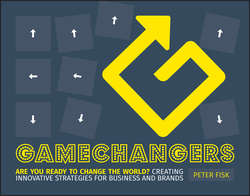Читать книгу Gamechangers - Fisk Peter - Страница 14
На сайте Литреса книга снята с продажи.
PART 1
ARE YOU READY?
2
CHANGE.. CHANGE THE GAME
WORLD-CHANGING, GAME-CHANGING
EXPLORING NEW POSSIBILITIES
ОглавлениеThe idea of extrapolating the past to understand the future, even in a non-linear way, no longer works. The speed of change, the step change of capabilities, creates a future that is seismically different, and better, than our past.
Innovations emerge at incredible pace. I still struggle to remember life just 10 years ago when I couldn't order my shopping online, read the newspaper on my tablet, hire a funky car for the day, or listen to limitless free music. The emergence of new materials like graphene, the upgrading of networks to superfast bandwidth, the miniaturization of semiconductors are all quietly converging to create amazing futures, fast.
The ‘internet of things', where physical objects from beer bottles to street lights are digitally connected, will make our environment more intelligent, personal and convenient. Already smart thermostats control the temperature of our homes without a thought, cars can alert each other of traffic jams ahead, drone aircraft are deployed in warfare, and plants can text or tweet that they need watering.
By 2020, research firm Gartner believes there will be more than 30 billion ‘things' online, a $15 trillion market. Darpa, the defence innovators, have developed AlphaDog that can walk for 20 miles without resting, Google's glasses will drive actions based on eye movements, Samsung are developing phones that have a sense of touch and computers that can smell. The stories of new possibilities are endless, ‘gamechanging' is about making them real.
Mobile solutions – whether it's banking, shopping or healthcare – will be worth $4.5 trillion by 2020, according to Bain. However this will demand better and faster network coverage. Rethinking wi-fi based on much smaller and frequent transmitters in urban areas is one option, popular in dense cities like Seoul and Tokyo. Meanwhile Chamtech have developed a more radical solution – spray-on wi-fi – a liquid containing millions of nano-capacitors, that can be sprayed onto any surface, like clothes and cars, creating local, satellite-enabled, hotspots wherever people are.
Air travel is expected to double in the next decade, according to IATA, driven by the demand of emerging middle classes. Significantly more efficient planes will be needed, to reduce time, costs and emissions. Slovenian aircraft maker Pipistrel has developed an electric aircraft that also benefits from smarter navigation systems that allow it to find shorter routes, sensing thermal flows and negotiating complex paths. Meanwhile NASA has developed a twin-cylinder engine that can be mounted at the back of the plane, thereby requiring 50 % less fuel and significantly reducing noise too.
Gadget-mad people are always looking for power sockets. And the biggest component in the devices is usually the battery. Miniaturized capture of solar power will transform gadgets. They will use micro-batteries mimicking photosynthesis, using metal oxides heated by the sun, to split sea water into hydrogen and oxygen. Hydrogen, clean and abundant, could then power a whole array of micro-machines, from the next generation phones to nano-tech medical implants.
The sun really is our best source of energy. It's obvious really, but we haven't yet been able to harness the obvious. Desert wastelands soak up more energy in six hours than the world uses in a year. Desertec seeks to harness that potential with hundreds of square miles of wind and solar plants feeding the world's electric grids with clean cheap and reliable solar power provided it can get nations working together: 90 % of the world lives within 1800 miles of a desert, and 1300 square miles of Saharan desert, for example, could power 20 % of Europe. It could transform the fortunes of Africa as well as solve the world's fossil fuel crisis.
